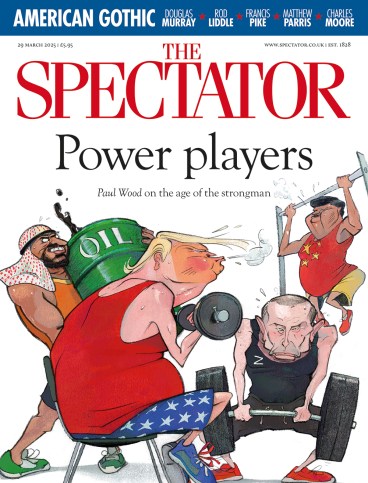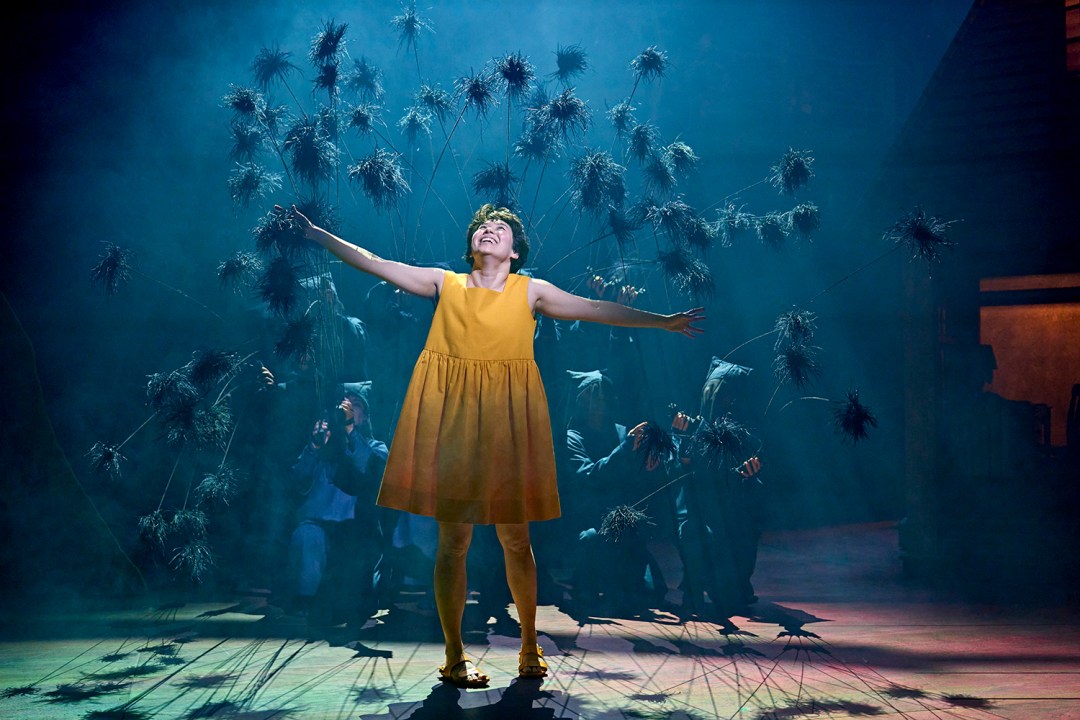
My Neighbour Totoro is a hugely successful show based on a Japanese movie made in 1988. The setting is a haunted house occupied by two little girls who encounter various creatures rendered on stage by puppets. The story has no action, danger or jeopardy so it’s likely to bore small boys and their dads. Perhaps mums and daughters will appreciate it more.
The big selling point is the puppetry whose quality varies. The naturalistic animals are done well. Cute yapping dogs, fluffy chickens scampering about, mischievous goats that steal maize from unguarded fields. The silliest creature is an orange latex cat equipped with 12 spindly legs that don’t work. It looks like a cross between a bed bug and a crippled tiger. The haunted house is infested with flying black spiders that seem to be made from tufts of armpit hair. These revolting pests look scary but they turn out to be harmless like all the beasts in this slow-moving fantasy. The whole point of a mythical creature is to wield supernatural powers and to perform deeds that amaze human beings. Not here. These deformed mutants lack any special abilities and they look like botched experiments abandoned by a mad Victorian scientist.
The main puppet, Totoro, is a cuddly koala bear as large as a campervan that likes being tickled. He has a kittenish face and rabbity ears but he’s so fat that he can’t move. In fact he looks like a 14ft-high hot-water bottle. He manages to stand up very briefly but he’s more content lying on his back, unconscious. If stirred from his coma by a child, he can blink his eyes, raise a clawed hand and open his mouth to reveal a set of gleaming white teeth that Simon Cowell would be proud of. Otherwise he’s useless. He’s also physically defenceless. Why don’t the girls kill him and eat him? No idea.
Strange title, Retrograde. If your play is about a celebrity you shouldn’t keep it a secret. The show by Ryan Calais Cameron examines the early career of Sidney Poitier. It opens at an NBC office in 1957 where two movie hacks, Larry and Bobby, are awaiting the arrival of the rising star. Bobby is an ambitious writer who hopes to profit from his friendship with Sidney. Larry, Bobby’s mentor, is a streetwise hustler who works as the head of NBC’s legal department.
Enter Sidney in a garish purple jacket and matching socks. He’s dressed like a pimp and he comes across as aloof, prickly and charmless. Instead of cosying up to Larry, he refuses to drink his whisky. And for some reason he declares that he won’t play a character whose morality he dislikes. (That kind of attitude would keep any actor out of work for ever.) The mood changes suddenly. Sidney relaxes, drinks some booze, and tells a few funny stories about auditioning on Broadway. Larry starts to warm to him. Then the plot develops very fast. Larry reveals that Sidney is a candidate for a major film role but he has to convince the studio that he doesn’t share the views of radicals such as Harry Belafonte and Paul Robeson. Out of nowhere, Larry turns into a replica of Senator McCarthy, pounding the desk and grilling Sidney about his political leanings. Sidney grows angry, fronts up to Larry and threatens him with a revolution. ‘We’re a movement,’ he cries. ‘We’re coming. Expect us!’ A moment later, Sidney becomes contrite and submissive again. ‘Sorry, sir,’ he says to Larry. Both characters are very confusing. They seem to be collections of moral attitudes and negotiating positions rather than genuine human beings with real motives and instincts.
This imperfect play feels like a big hit
This flaw, though serious, is not fatal to the play as it reaches its climax. Larry offers Sidney a deal. If he signs a statement denouncing Paul Robeson, he’ll get the movie contract and become a star. If he doesn’t, he’ll be ruined by the studio system. From here, the show develops into a thrilling contest of wills between Sidney and Larry. The writer, Bobby (Oliver Johnstone), plays the role of the vacillating middleman who considers betraying his principles in return for a decent reward. Bobby is you and me, in other words, and his character gives the play a sense of moral urgency and immediacy. Stanley Townsend manages to find every note in Larry’s over-extensive character. He’s a bully, a charmer, a tyrant, a joker, a thug and, at times, an avuncular confidante. Ivanno Jeremiah also disguises the faults in Sidney’s character and makes him seem like a real individual rather than an almanac of speeches and bumper-sticker quotations.
This imperfect play feels like a big hit. If the box-office does well, the management might stretch of a lick of paint for Larry’s office. On press night, the rear wall looked like
bare plywood.









Comments